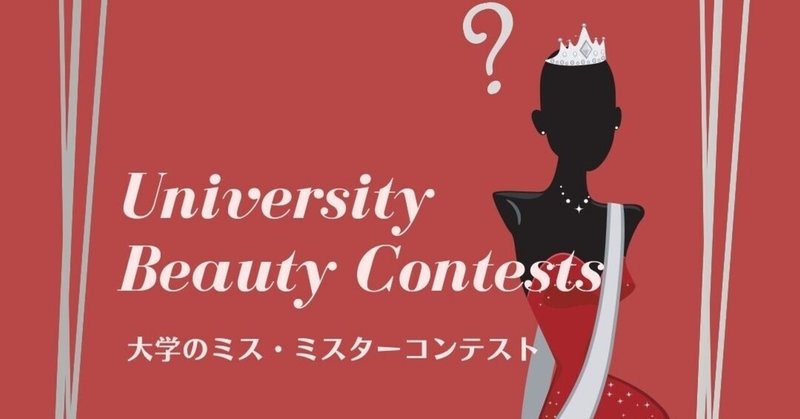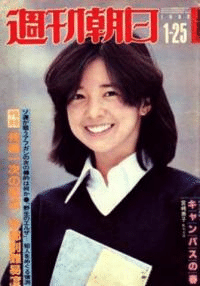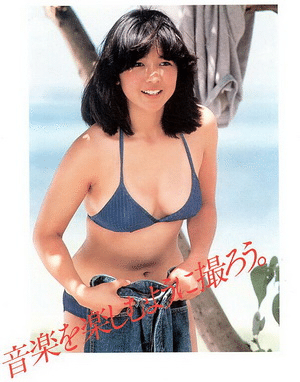
大学のミス・ミスターコン(GirlUp Tokyo掲載記事拡大版)英語拙訳あり
2021年7月16日にGirlUp Tokyoで「大学のミス・ミスターコンテスト」というテーマの投稿を担当させてもらいました。
インスタグラムの投稿ということもあり、文字数が限られている関係で仕方なくカットしてしまった部分がありましたので、原文をこちらに載せようと思います。
以前、ミスコンについての記事で『【無意識に痩せる】ミスコンと私のカラダ』というものをこちらで公開しました。そのときには調べられていなかったミスコンの歴史や論点について、インターネット記事や文献をあたりました。
今回は、こちらの記事よりもより客観的ですし、ミスコンという一文化についての勉強になることと思います。前の記事は、私的な体験談。今回は、客観的なレポートとして読んでいただけると嬉しいです。
それでは、本編へどうぞ~(^▽^)/
1.大学のミス/ミスターコンテストとは何か
What is the university beauty contest?
・大学祭の一大イベントとして、大学祭実行委員会やサークルなど学生により運営される
・学内外を問わず不特定多数の人々の投票によってグランプリを決定する
・多くの場合、選考は春から始まり、いくつかの予選を経て秋の大学祭本番を迎える
・大学祭当日は女性がウェディングドレスを、男性がタキシードを着ることが多い
・企業がスポンサーとなって運営資金を援助する
・女子アナウンサーの登竜門という一面を持つ
※ほとんどの場合、大学側は運営に関わっていない。学生が独自にマーケティングや代理店的な働きを経験するために行っているとされる。
・ As one of major events of the university festival, it is run by students such as the festival executive committee.
・ The Grand Prix will be decided by voting by an unspecified number of people both inside and outside the university.
・ In many cases, the selection start in spring, and after several qualifying rounds, the finalists are judged in university festival in fall.
・ In many university, they offer the finalists to wear wedding dresses for girls, black ties for boys.
・ Companies sponsor and support operating funds.
・ Has one aspect of being a gateway to female newscasters
* In most cases, the universities are not involved in the operation. It is said that students are doing it independently to experience marketing and agency work.
青山大学のコンテスト公式インスタグラムより(2019)
2.時代とともに見る大学のミスコンテス
The transition of beauty contest in university
▷1970年代にはすでに盛んでしたが、批判の対象となることも多くありました。
▶1974年 初の大学横断型のミスキャンパスコンテストが都内で行われる
慶応大学の男子大学生が仕掛け人で食品メーカーから1,000万円近い協賛金を受け実現した。水着審査が多くの参加女子学生から反感を買い着用を任意にしたところ、最終審査で10名のうち脱いだ4人が上位入賞するという結果に。
▶1978年 名古屋大学
「ミス・キャンパスコンテスト」が、女性問題研究会からの抗議を受けて中止となりました。同会は「女性が男性にとっての性的対象物であるという歴史的な男性中心の論理をそのまま受け継ぐものである」と訴えました。
▶1987年 東京大学
「東大生GALコンテスト」本番に抗議運動が行われました。変装して花火のようなものを持つ学生が次々と舞台に上がり、主催者側との乱闘騒ぎに発展しました。
▷1980年代半ばから1990年代にかけて各メディアで一般の女子大学生が活躍する「女子大生ブーム」が起こります。女子学生自ら「自分を磨きたい」「キャリアアップに繋げたい」という動機で参加を望む場合も多く、大学ミスコンは現在まで続いてきました。
▷It was already popular in the 1970s, but it was often the subject of criticism.
▶In 1974, The first cross-university Miss Campus contest is held in Tokyo
A male university student at Keio University was the starter and received a sponsorship of nearly 10 million yen from a food manufacturer. The swimsuit examination was criticized by many participating female students and made them optional. But in fact, 4 out of 10 people who took off their clothes in the final examination won the top prize.
▶1978 in Nagoya University
The "Miss Campus Contest" will be canceled in response to a protest from the Women's Issues Study Group. They said, "It inherits the historical male-centered logic that women are sexual objects for men."
▶1987 in University of Tokyo
A protest campaign was held during the " Tokyo University GAL Contest". Students in disguise and holding something like fireworks went up to the stage one after another, and it developed into a brawl with the organizers.
▷From the mid-1980s to the 1990s, there was a "female university student boom" in which general female university students played an active role in various media. Also, female students often want to participate with the motives of like "I want to improve myself" or "I want to improve my career". Thus, university beauty contests have continued to this day.
1980年「女子大生ブーム」で一世を風靡した女子大生モデルの宮崎美子が、週刊朝日の表紙を飾った。


才色兼備な“素人”の女子大生が水着姿を披露したことで話題となった。
3.コンテスト廃止への動き
Movements to abolish the contests
国際基督教大学 2011年に廃止
「多様な人間のあり方が尊重」されなければならないとして
法政大学 2019年に廃止
「多様な人格への敬意」と相反するためとして
ミスコン&ミスターコンを考える会
東京大学をはじめとした、キャンパスの&ミスターコンテストについての懸念をまとめ、中止を求める会。学内外問わず仲間を募集しています。
International Christian University abolished it in 2011
"Diverse human beings must be respected"
Hosei University abolished it in 2019
“Conflict with ‘respect for diverse personalities’”
Misu-con & Misuta-con wo kangaerukai (The meeting thinking about beauty contest)
A group that summarizes concerns about the Campus & Mr. Contest, established at Tokyo University, and calls for cancellation. They look for participants from all the university.
4.コンテスト改善への動き
Movements to improve the contests
上智大学 2020年
学内外からコンテスト批判の声を受け、実行委員会と大学の協議の結果「ミス/ミスターコンテスト」の名称が「ソフィアズコンテスト」に変更。選考方法にも特色があります。
・ジェンダーを問わず候補者を募集
・見た目だけで判断されることを避けるため、審査に①SDGs部門、②スピーチ部門、③自己PR部門という段階を設ける
慶応大学 2020年
「ミスター・ミス慶應SFCコンテスト」では性別に関しての応募条件を廃止。ミスターコンテストのファイナリストに性自認が「男性でない」学生の1人が選ばれました。
Sophia University in 2020
The name of "Miss / Mr Campus" was changed to "Sophia's Contest" as a result of discussions between the executive committee and the university in response to criticism of the contest from inside and outside the university. The selection method is also unique.
・ look for candidates regardless of gender.
・ In order to avoid being judged only by appearance, there were stages of (1) SDGs department, (2) speech department, and (3) self-promotion department.
Keio University in 2020
"Mr/Miss Keio SFC Contest" abolished the application conditions regarding gender. One of the students whose gender identity was "non-male" was selected as the finalist of the Male Contest.
ミスター慶応SFCコンテストのファイナリストとなった篠原かをりさん。本人インスタグラムより。
5.有識者からの反対の声
Oppositions from some experts
教育ジャーナリスト 小林哲夫さん
「少なくとも大学という教養、専門知の場でそういうことをやるのはふさわしくありません」
東京大学名誉教授 上野千鶴子さん
「『ミス』は『未婚女性』限定、つまり特定の男に所属しておらず、誰でもアクセス可能なお嫁さん候補に男性目線で順位をつけようというもの。廃止運動は1980年代からもう半世紀近くにわたって行われています」
Tetsuo Kobayashi, Education journalist
"At least it's not appropriate to do that in university, a place of education and expertise."
Chizuko Ueno, Professor Emeritus of the University of Tokyo
"'Miss' is limited to 'unmarried women', that is, to rank bride candidates who do not belong to a specific man and can be accessed by anyone from a male perspective. The abolition movement has been around for almost half a century since the 1980s. “
6.コンテストについての賛否両論
Pros and cons of university beauty contests
(賛成派)やりたいひとがやっていることだからよい
(反対派)・コンテストは「女性/男性はこうあるべき」という社会の中での価値観を再生産しているため、参加の有無に関わらず全員が加害者・被害者になりうる
・誰を推薦するかという段階ではすべての人が当事者になりうる
(賛成派)コンテストは既に多様性を持つのではないか
(反対派)・歴代のファイナリストに特定の嗜好が見られる
・多様性を格付けし、選ぶという行為自体がナンセンスである
などなど
(Pros) They do it at their own will.
(Opposition) ・ Since the contest reproduces the values in society that “women / men should be like this”, everyone can be a perpetrator and victim regardless of participation.
・ Everyone can be a party at the stage of who to recommend.
(Pros) Contests may already be diverse.
(Opposition) ・ Successive finalists have specific tastes.
・ The act of rating and choosing diversity is nonsense.
and more
7.ミス/ミスターコンテストとともに社会について考えてみよう
Let’s reflect our society with thinking about beauty contests
和歌山大学教育学部 西倉実季准教授
問題の本質は、「ミスコンのように女性を外見で評価し、品定めすることが社会の中で繰り返されていること」であるとし、「大学のコンテストだけにとどまらず、日常的にミスコンのような状況が起きていないか注意してみていく必要があります」と語ります。
自分が望んでもいないのに勝手に評価されることは、日常的に起こっています。その繰り返しによって、自分自身も知らずのうちに“美しさ”に高い価値を置いてしまい生きにくさを感じてしまう...。こうした人は多いのではないでしょうか?
身近に隠れる「ミスコン的状況」がないか注意してみましょう。
Miki Nishikura, Associate Professor, Faculty of Education, Wakayama University
The essence of the problem is that “evaluating and deciding women by appearance like a beauty contest is repeated in society” she said. " We also need to be careful if something is wrong with us, which is not just a university contest, but also similar to the contest. "
It happens every day that people are evaluated without their wishes. By repeating this process, we find it difficult to live by placing high value on "beauty" without even knowing it. Isn't there a lot of people agree with this?
Let's be careful if there is a "Beauty contest-ing situation" that is hidden around us.
8.参考文献
References
9.記事を書いてみての個人的な感想を少し
私はコンテストに関しては、肯定派でも否定派でもない中立派です。賛否両論のところでピックした「やりたいひとがやっていることだからよい」という肯定意見にも「でもそれは男根社会的な価値観の再生産だから」という否定意見にも賛成できてしまう自分がいるからです。
これからコンテストがどうなっていくのかというと、それは大学の判断と、人々の価値観の変化にかかっていると思います。
まずは、大学の判断。ミスコンを大学でやるというのは、常識的に考えてイカれた文化ですよね(笑)そもそも大学は勉強をする場所。文化祭は、実践的に商売を体験する場、芸術表現の場、そしてオープンキャンパスの場として設けられているんだと思うんですが、そのために人をランク付けするイベントを使う必要はないので。スポンサーをつけて大規模なイベントを実行するにしても、音楽、映像、ダンス、伝統芸能など、ミスコンに頼らないほうが自由で面白い企画ができそうな気がします。
そして、人々の価値観の変化。私は正直、今のミスコンが「タイプじゃない」です。特に都内私立大ですね。白い洋服を着て純粋さをアピールした上目遣いの女の子たち。彼女たちが計算されつくしたか弱さを利用しているのは、頭がいいなと思うのと同時に、頭がいいからこそ、個性が排除されていて悲しくもあります。また、「こういうのが好きなんでしょ」とでも言うようにお膳立てされた女性に対して、喜んでしまう人々が単純で幼稚に感じます。簡単に言うと、そんな女のタイプはダサいよ、ってことです。ミスターコンテストについては、興味をもって見たことがないのでわかりません。「こういうのが好きなんでしょ」とお膳立てされた“イケメン”たちがタイプではないのからかもしれません。(本当に個人的な感想です!!!!!)
私のように「なんか、こういうの幼稚でダサいな」「タイプじゃないな」と思うひとが増えていけばミスコンという文化はなくなるか、上智慶応のようにミスコンの形式が変化していくのではないでしょうか。アイドル業界でいうと、無抵抗で可愛らしい魅力の乃木坂がいる一方で、反抗的で痛みのある欅坂や、パンクバンドのBiSHの人気が出たところからもその片鱗が見えるような見えないような、、、。
というところで、今回の記事は以上になります。本編のほうも、時間があるときに書き進めたいと思います。GirlUp Tokyoの記事も定期的に書かせていただく機会があると思いますので、また投稿に収まらないほど調べてしまったときにはこちらでシェアしたいと思います。
長いこと読んでくれてありがとうございま~す
んじゃっ。
この記事が気に入ったらサポートをしてみませんか?
